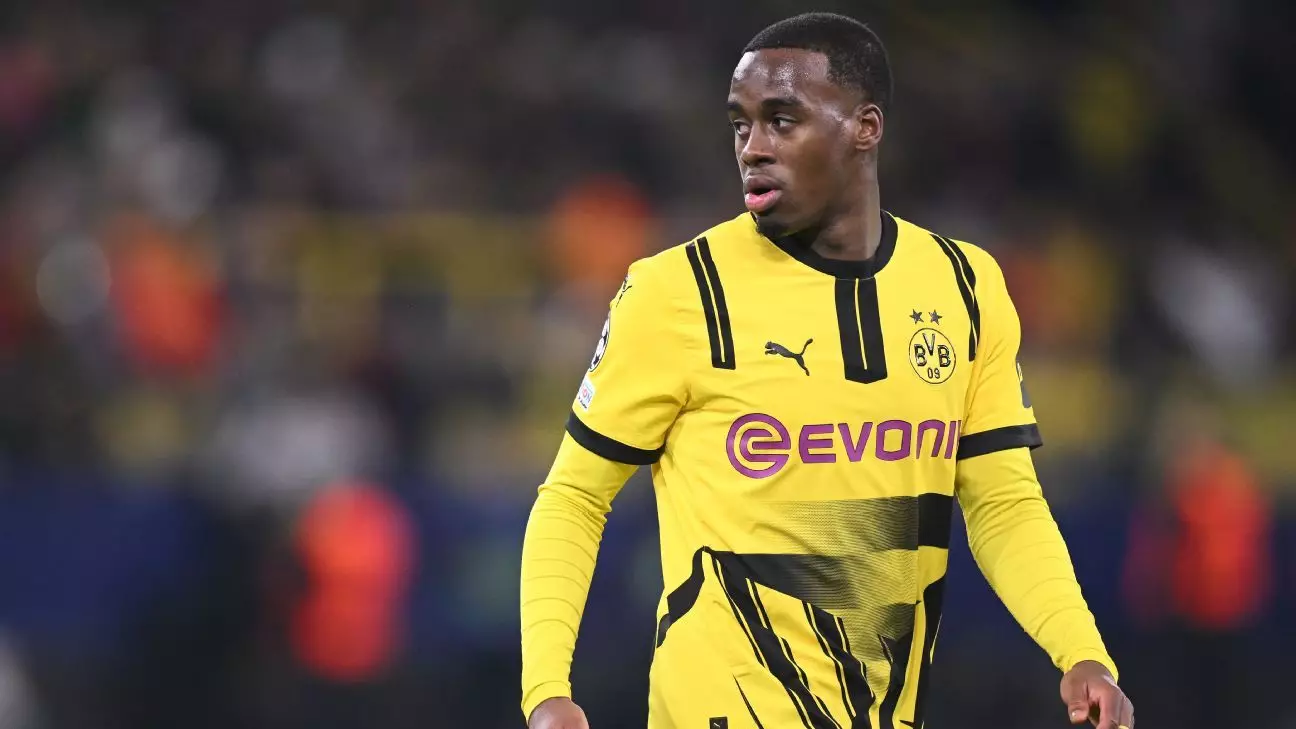The football transfer landscape is never dull, constantly shifting with rumors and aspirations as clubs vie for the best talent. As we delve into this latest chapter in the ongoing saga of player acquisitions, several key narratives have emerged, showcasing the competitive spirit of clubs across Europe.
In the heart of the transfer discourse, Borussia Dortmund’s Jamie Gittens has emerged as a prime target for a trio of English football’s elite: Arsenal, Chelsea, and Tottenham Hotspur. The 20-year-old winger’s potential move has captivated interest due to his impressive output this season—contributing to 14 goals in just 32 matches across all competitions. The reported price tag of €80 million makes it clear that Gittens is not just a rising star but a coveted asset; one that these clubs are willing to spend considerable sums to acquire.
However, with Barcelona now reportedly dropping out of the race due to their financial instability, the English clubs seem poised to capitalize. This scenario highlights a crucial transition phase for clubs as they adapt to shifting financial landscapes, particularly those navigating the aftereffects of the pandemic. Gittens represents not only immediate impact potential but also a long-term investment, embodying the youth movement currently sweeping through the Premier League.
While Gittens may be attracting the Premier League’s attention, Barcelona finds itself at a crossroads regarding its own transfer strategy. Reports indicate that the Catalan giants have rejected opportunities to sign seasoned stars like Joshua Kimmich of Bayern Munich and Liverpool’s Virgil van Dijk. This decision, led by sporting director Deco, reveals a strategic pivot towards nurturing younger talent, deviating from the model of investing heavily in established names.
Kimmich and Van Dijk, both nearing the latter stages of their careers, may have provided immediate contributions, but Barcelona’s focus appears to be directed toward fostering a new generation within its ranks—possibly a sign of a rebuild aimed at sustained long-term success rather than temporary fixes. This tells a compelling story of modern football’s changing dynamics, where clubs must balance immediate needs with long-term aspirations, all while adhering to stringent financial regulations and objectives.
As uncertainty looms over the future of Virgil van Dijk—whose contract with Liverpool evaporates in four months—the club is gearing up to explore potential replacements. Reports indicate Bournemouth defender Dean Huijsen as a candidate, showcasing Liverpool’s proactive approach to securing necessary defensive stability. Huijsen, with a release clause of £55 million, illustrates how clubs are now scouting talent based on suitability to their tactical philosophies, a practice that has gained traction among clubs seeking cohesive squad dynamics.
In light of van Dijk’s potential departure, Liverpool’s search not only underscores the urgency of the situation but also emphasizes the significance of cultivating a robust defensive lineup—an element vital for any ambitious side looking to contend for titles.
On a celebratory note, AC Milan is reportedly closing in on a contract extension for goalkeeper Mike Maignan. Securing Maignan until 2029 illustrates the club’s intent to solidify its backbone with reliable talent. With a proposed salary of €5 million per year, this contract underlines the urgency for clubs to retain key players, demonstrating an understanding that such continuity can be invaluable for maintaining competitive standards in both domestic and continental competitions.
Finally, the future of 20-year-old Nico Paz is generating intrigue as Como prepares to engage in discussions with Real Madrid regarding the player’s potential return. The clauses in the original transfer agreement complicate matters, but Como sees Paz as integral to their project moving forward. This scenario hints at the complexities of modern player agreements and how they can intertwine club interests in multi-club arrangements, further demonstrating the intricacies of football’s business model.
As the European transfer market continues to evolve, the intertwined narratives of clubs pursuing talent, financial strategies, and player aspirations will be critical in shaping the landscape for years to come. The coming weeks promise to be pivotal as clubs finalize their strategies in pursuit of success on and off the pitch.

